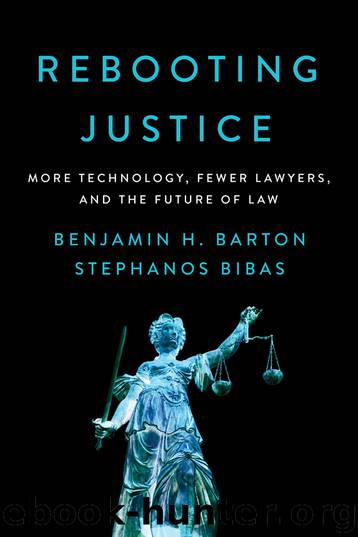Rebooting Justice by Benjamin H. Barton

Author:Benjamin H. Barton [Barton, Benjamin H.]
Language: eng
Format: epub
ISBN: 9781594039348
Publisher: Encounter Books
Published: 2017-05-26T00:00:00+00:00
A Hundred Flowers Bloom
Modria is just one of many companies looking to change the way we deliver legal services in America. As late as 2011, Professor Gillian Hadfield was asking: “Where are the ‘garage guys’ in law?”11 The last few years have answered this question quite emphatically. In 2012, legal tech startups took in an estimated $66 million in venture capital. In 2013, that amount was $458 million.12 The startups run the gamut from well-known providers of legal documents like LegalZoom or Rocket Lawyer to Judicata, a new legal research company that is aiming to “map the legal genome.”
For years the legal profession has underserved the poor and the middle class, chasing after the more lucrative work of representing injured plaintiffs suing corporations or working for the corporations themselves. Many of these legal tech startups have taken the opposite approach. They are focused squarely on servicing the underserved part of the market, offering legal services as cheaply as possible to as many customers as possible.
Tech companies see the legal market as ripe for a revolution. For example, Forbes notes that Internet legal startups match the classic venture capital checklist: They offer a “disruptive model in a huge, decentralized business” and they often target “the high-volume, low-cost business of providing basic consumer and business documents.”13 The legal profession has woefully underserved this exact market.
For our purposes, it is worth dividing these innovations into three different categories, to match the three different kinds of legal work the poor and middle class typically need. We discuss them in order from the most promising to the least promising: access to the raw materials of law, access to legal documents and legal advice, and access to in-court assistance. Some of these problems are very close to being solved already and some will take more work, but progress is being made on every front.
There are two obvious caveats at the outset. Americans who are illiterate or lack access to a computer with Internet access will obviously not benefit much from the computerization of law. Access to the Internet is continuing to grow, however. Approximately 70% of Americans have a broadband connection at home, including more than half of households with incomes below $30,000. Almost all public libraries provide free access to the Internet and computers. New York and California offer a number of court-sanctioned online forms and provide free computer kiosks in clerk’s offices or court law libraries for form creation and legal research. Many of these legal innovations are usable on a smartphone as well, and 68% of American adults own a smartphone.
Even fluency in English or literacy can be worked around. The most successful online document assembly programs aim their interactive legal forms at a middle school reading comprehension level. Likewise, the most successful programs are translatable into other languages like Spanish or Chinese.
But, even if it is true that technology can do little for the poorest of the poor, it can still help by harvesting the low-hanging fruit and allowing legal aid and pro bono to focus more narrowly on these neediest Americans.
Download
This site does not store any files on its server. We only index and link to content provided by other sites. Please contact the content providers to delete copyright contents if any and email us, we'll remove relevant links or contents immediately.
| Antitrust | Civil Law |
| Emigration & Immigration | Federal Jurisdiction |
| Housing & Urban Development | Indigenous Peoples |
| Land Use | Public |
| Public Contract | Public Utilities |
| Urban, State & Local Government |
Machine Learning at Scale with H2O by Gregory Keys | David Whiting(4312)
Killers of the Flower Moon by David Grann(4054)
Oathbringer (The Stormlight Archive, Book 3) by Brandon Sanderson(3212)
Will by Will Smith(2919)
Once Upon a Broken Heart by Stephanie Garber(2858)
Guns, Germs and Steel by Diamond Jared(2369)
It Starts With Us (It Ends with Us #2) by Colleen Hoover(2367)
Borders by unknow(2313)
Friends, Lovers, and the Big Terrible Thing by Matthew Perry(2230)
The Room Where It Happened by John Bolton;(2159)
The Color of Law by Richard Rothstein(1948)
A Short History of War by Jeremy Black(1848)
The Strength In Our Scars by Bianca Sparacino(1842)
HBR's 10 Must Reads 2022 by Harvard Business Review(1841)
A Game of Thrones (The Illustrated Edition) by George R. R. Martin(1744)
Water Rights and the Environment in the United States by John Burch(1686)
515945210 by Unknown(1665)
Examples & Explanations: Administrative Law by William F. Funk & Richard H. Seamon(1646)
That Every Man Be Armed by Stephen P. Halbrook(1582)
